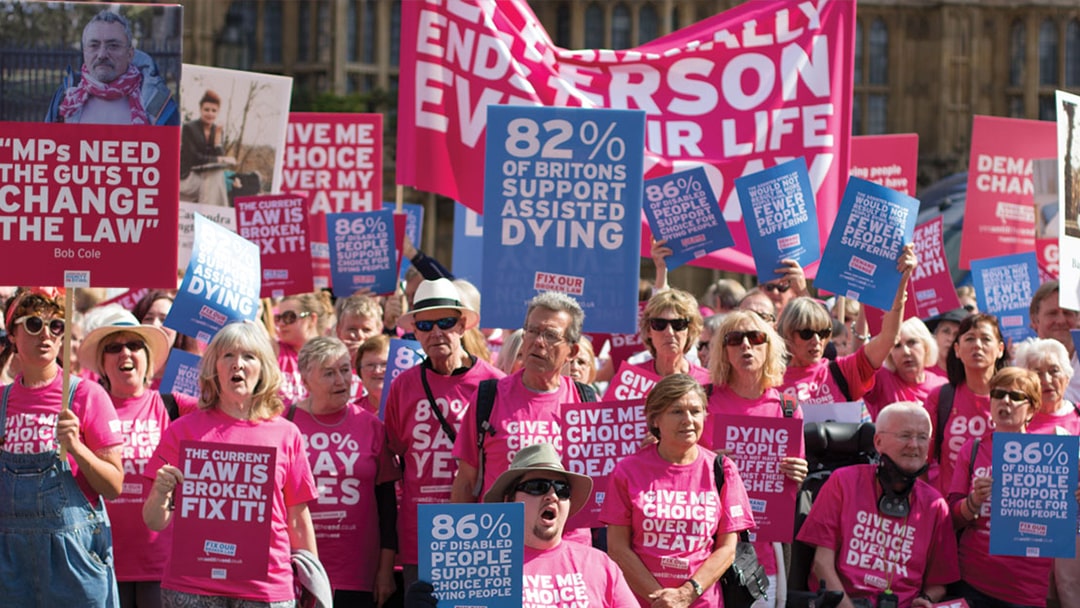Alan Otter, an old friend of Rtn Raj Menon, is a member of ‘Dignity in Dying’, a national campaign advocating a change in the UK law to permit assisted dying. Raj, while disagreeing with Alan, invited him to the club to tell us about the issues. The subject is controversial and difficult, although public opinion appears to be moving in favour of change.
The current law is contained in the Suicide Act of 1961, which abolished the common law crime of suicide, but retained the offence of encouraging or assisting suicide. This offence is punishable with a maximum of 14 years imprisonment. Such a severe punishment would no doubt be reserved for offenders who threaten or put pressure on a person to commit suicide, but the offence is not limited to that, and includes people who, from motives of pure compassion, assist in the suicide of a loved one who finds living has become intolerable. Is it right that such compassionate people are at risk of going to prison?
Views may differ, but Alan has clearly made up his mind. He can never forget the final words of a beloved uncle, who in intolerable pain had unsuccessfully begged his consultant to end his life. After further prolonged suffering, beyond the reach of available palliative care, the uncle’s dying words to Alan were You wouldn’t treat a dog like this. Not long after, Alan had to witness his mother suffering terrible pain in the final two weeks of her life.
Even with good palliative care, there will remain a small number of people suffering dreadful pain who wish they could end their lives. What are they to do?
Unassisted suicide is a dismal process. Thousands of people attempt suicide each year by various means, nine out of ten failing, and often cause themselves and others incalculable distress in the attempt.
Alan told us that about one terminally ill person a year travels to Switzerland and pays Dignitas £13,000 to end their life painlessly under medical supervision. If they are able to get to Switzerland without assistance, they are probably ending their life before they would wish. If they wait until they need assistance to get there, anyone helping them runs the risk of prosecution under the Suicide Act.
In the past, doctors have been consistently against the concept of assisted dying. As Raj put it at our meeting, he trained as a doctor to save lives, not to end them.
There has been a change of attitude in recent years. In 2019 the Royal College of Physicians ended its opposition to assisted dying, and in January 2023 the British Medical Association did the same. A recent poll of GPs showed an equal split on the issue, although palliative care consultants remain overwhelmingly against the concept, arguing that what is required is more adequate funding for care. Religious leaders are divided on the subject.
Six years ago the House of Commons decisively rejected a Bill to allow assisted dying. Since that time the number of jurisdictions permitting a form of assisted dying has grown considerably.
It is now permitted in Switzerland, Luxemburg, Belgium, the Netherlands, Austria, Canada, New Zealand, two states in Australia and eleven states in the USA. Legislation has often followed a referendum, with Italy the latest country to plan to hold one. Oregon and the Netherlands have over two decades of experience of legally sanctioned assisted dying, with it accounting for only 1% of all deaths.
Opponents of the measure do not rely on purely ethical considerations, but fear that it could impact disproportionately on the disabled and vulnerable. A recent television documentary highlighted a case from Canada, where reform now permits medically assisted suicide for patients overwhelmed by physical or mental problems but not terminally ill. The patient was blocking a bed, social care was not available and he was invited to consider medically assisted suicide. And a chilling statistic: Vancouver is now the assisted suicide capital of the world, with 7.5% of all deaths being from that cause.
In the light of all this experience, Baroness Meacher, the Chair of Dignity in Dying, recently put forward a new private members’ Bill in the House of Lords. Alan listened to all six hours of the debate, and was impressed by the speeches on both sides of the argument.
The Bill was modest in scope, aiming to give terminally ill, mentally competent people over the age of 18 the right to choose the manner and timing of their death. Two independent doctors would have to confirm the person requesting assistance had a life expectancy of no more than 6 months, relatives would be interviewed to check the person had reached a settled decision, and the entire process would require the approval of a Family Division High Court Judge. Once approved, a prescription would be sent to a pharmacist, to be collected only when the patient felt it was the right time to die. Two decades of experience in Oregon reveals that two thirds of patients who have registered for an assisted death never use the option because of good end of life care, but have derived comfort from knowing that an assisted death was available and they would be enabled to die with dignity.
Unfortunately the Bill ran out of parliamentary time.
Our meeting also ran out of time and we did not find out what our consensus view was. Alan understands that the House of Commons is to hold an inquiry next year, looking in particular at the experience of other countries. He concluded by saying that the question was above his pay grade, and he expressed the hope that it will return to Parliament for further debate, and decision one way or the other.

